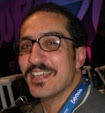Going Mobile
A few weeks ago, Stanley Borg invited me to write something about mobile phones for a cover feature he was producing for the Weekender pull-out, published with the Times on Saturday 13 August 2005. I wrote about 700 words in a hotel room just outside Atlantic City one morning after breakfast. The Times has now placed my text on its website, but since I know they'll remove it within a few months I thought I'd reproduce it on my blog too. Incidentally, this text is actually little more than some more notes for my autobiography project.
from Weekender - 13 August 2005
Toni Sant on Mobile Phones
You may think that someone who doesn't carry a mobile phone is nostalgic for a time before wireless telephony became as pervasive as it is today. In Toni Sant's case nostalgia has nothing to do with it. If anything, he's a futurist.The first time I touched a mobile phone was sometime in 1990 when I worked as a radio producer at Xandir Malta. Telecell, the name of the new company offering mobile phone services back then, was a sponsor for one of our weekend evening radio broadcasts, which featured live reports from various venues. The idea was to have two or three broadcasters calling in reports from the Manoel Theatre, the Catholic Institute, the Mediterranean Conference Centre, or some entertainment venue in Paceville. I believe we even had reports from Gozo a couple of times.
It was very awkward taking the bulky grey phone that we had in those days with me to the Manoel Theatre. Yet, it felt electrifying to tell radio listeners that I was standing in a second-tier box at Malta's national theatre completely untethered, reporting live about a theatrical performance or other without the technical complexity that come with fully-fledged outside broadcasting facilities. The fact that we were broadcasting live using mobile phones was more interesting than the actual shows we were reporting about.
When I left Malta in the mid-1990s, I lived the life of a full-time university student. Mobile phones were not within our budget; even for those students who didn't mind having a huge debt after graduation. Besides, the life I chose for myself away from Malta included a stronger desire not to be reached wherever, whenever. By that time I had started using e-mail. I was among the first dozen Maltese people around the world who had e-mail. So, if pushed, I could be reached wherever, whenever... but in my own time.
Over the last five years or so, mobile phones have become very affordable and much easier to carry around. However, I have retained my desire to be reached wherever, whenever, only in my own time. To tell the truth I barely even use my landline. If it weren't also that I brought broadband internet access into my home I doubt I'd even have a telephone landline. My phone hardly ever rings anyway. The internet satisfies my most basic telecommunication needs and more.
Between wireless internet access and voice over IP, I carry with me the future of mobile telephony every day in my Apple PowerBook. Still, I have no desire to carry any of the conventional mobile phones anytime soon. Things may change once mobile phones converge with portable broadcasting devices that access the web, mp3 players and a cappuccino maker. Other than the coffee part, this sort of device will appear in our hands within the next 10 years. As I see it, I'm describing a smaller PowerBook rather than a super mobile phone. Then again, is the glass half full or half empty?
I understand that a mobile phone is often very useful. One good example is during an emergency, of course. As yet, this still does not convince me to carry around a mobile phone with me at all times. You have no idea how lucky I feel do you? I also see it as a valuable tool in newsgathering (including the sort of broadcast reporting I mentioned earlier) and in making business arrangements on the fly. Thankfully, I don't need that sort of immediacy in my chosen profession as a university lecturer and my academic research on creative uses of the internet.
In America, mobile phones are called cell phones. This is because networks are laid out in a cellular infrastructure of signal towers and relays. However, I think of the word "cell" in cell phone as if it were the word cell in prison cell or cancer cell. If you carry your cell phone with you at all times, you obviously think there's nothing sillier than the last couple of sentences you just read.
I want to retain my own sense of space and time rather than have someone else determine it for me, wherever I can, whenever I can. Life is too short. The first sentences of this last paragraph is under the maximum word count for a standard text-message, and I plan to use it the next time someone asks me why I don't own a mobile phone. Meanwhile, please feel free to contact me via my website at http://www.tonisant.com - I promise to get back to you as soon as possible, but not while eating dinner nor during a face-to-face encounter with someone else.


















Well said Toni!
I just got an email from Stanley Borg telling me that The Times only removes news articles from their website. Features remain online...or at least they have been left online since the website was created 4 years ago.
Thanks for the update, Stan.
Post a Comment
<< Home